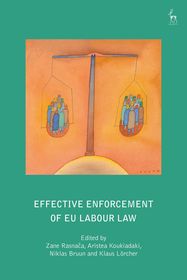
Effective Enforcement of EU Labour Law
- Publisher's listprice GBP 59.99
-
28 660 Ft (27 295 Ft + 5% VAT)
The price is estimated because at the time of ordering we do not know what conversion rates will apply to HUF / product currency when the book arrives. In case HUF is weaker, the price increases slightly, in case HUF is stronger, the price goes lower slightly.
- Discount 10% (cc. 2 866 Ft off)
- Discounted price 25 794 Ft (24 566 Ft + 5% VAT)
Subcribe now and take benefit of a favourable price.
Subscribe
28 660 Ft

Availability
printed on demand
Why don't you give exact delivery time?
Delivery time is estimated on our previous experiences. We give estimations only, because we order from outside Hungary, and the delivery time mainly depends on how quickly the publisher supplies the book. Faster or slower deliveries both happen, but we do our best to supply as quickly as possible.
Product details:
- Publisher Hart Publishing
- Date of Publication 25 January 2024
- Number of Volumes Paperback
- ISBN 9781509944453
- Binding Paperback
- No. of pages592 pages
- Size 234x154x34 mm
- Weight 880 g
- Language English 612
Categories
Long description:
This book by the ETUI Transnational Trade Union Rights Expert Network analyses enforcement as a key element making EU labour law effective or ineffective.
Enforcement is the key ingredient that makes rights effective and ensures compliance. It can make or break a legal system. Despite this, enforcement of EU labour law has received little scholarly attention in recent decades and has rarely been examined in a comprehensive way. This book aims to fill this gap.
Intended for academics and practitioners alike, the book adopts a threefold approach to examine this issue. First of all, it explores the idea of effective enforcement and sets out the wider context in which EU labour law enforcement takes place. Secondly, it analyses how enforcement operates in particular areas, including non-discrimination, health and safety, information and consultation rights, and the rights of migrating workers. Thirdly, it critically assesses the role of specific actors (in particular collective actors like trade unions, as well as whistle-blowers and the European Labour Authority) and settings (public procurement, economic and monetary policy) regulated by EU law. Drawing on the insights produced by these analyses, the book concludes by proposing a comprehensive Draft for a Model Directive on 'Effective Enforcement of EU Labour Law' as an inspiration for policy development and scholarly debate in this area.
Table of Contents:
PART I
UNDERSTANDING ENFORCEMENT
1. The Enforcement Structure for EU Labour Law
Antoine Jacobs (Tilburg University, the Netherlands)
2. Remedies and Sanctions in EU Labour Law
Aristea Koukiadaki (University of Manchester, UK)
3. Access to Justice
Klaus Lörcher (formerly European Trade Union Conference, Belgium)
4. Enforcing EU Labour Law by Means of Administrative Law
Joanna Unterschütz (University of Business and Administration in Gdynia, Poland)
5. Enforcement by Means of Criminal Law
Joanna Unterschütz (University of Business and Administration in Gdynia, Poland)
6. Soft Methods of Enforcement of European Labour Law Standards
Csilla Kollonay-Lehoczky (Central European University, Hungary)
7. Strategic Enforcement of EU Labour Law
Klaus Lörcher (formerly European Trade Union Conference, Belgium)
8. Enforcement of EU Labour Law in a Transnational Context
Mijke Houwerzijl (Tilburg University, the Netherlands)
9. The EU's Role in the Extra-territorial Enforcement of Labour Laws
Simon Deakin (University of Cambridge, UK) and Bhumika Billa (University of Cambridge, UK)
PART II
ENFORCEMENT IN SPECIFIC AREAS OF EU LABOUR LAW
10. Enforcing Non-discrimination
Csilla Kollonay-Lehoczky (Central European University, Hungary)
11. Enforcing EU Information and Consultation Rights
Silvia Rainone (European Trade Union Institute, Belgium)
12. Enforcing Migrant and Mobile Workers' Rights
Zane Rasnaca (European Trade Union Institute, Belgium)
13. Enforcing the Rights of Non-standard Workers
Barbara Kresal (University of Ljubljana, Slovenia)
14. Towards Effective Enforcement of Occupational Health and Safety Law in the European Union
Aude Cefaliello (European Trade Union Institute, Belgium)
PART III
MECHANISMS AND SPECIFIC ACTORS FOR ENFORCING EU LABOUR LAW
15. Enforcing EU Law via Collective Action
Giovanni Orlandini (University of Siena, Italy)
16. Collective Actors Enforcing EU Labour Law
Filip Dorssemont (Catholic University of Louvain, Belgium)
17. The European Labour Authority: Missing Link in the Cross-Border Enforcement of EU Labour Law
Piet Van Nuffel (KU Leuven, Belgium)
18. The Alert (Whistleblowing) in Light of the Enforcement of European Labour Law
Elliot Cobbaut (Catholic University of Louvain, Belgium)
19. Enforcing Labour Law via Public Procurement
Niklas Bruun (Hanken School of Economics, Finland)
20. The European Pillar of Social Rights: Transforming Promises into Reality
Olivier de Schutter (Catholic University of Louvain, Belgium)
21. Enforcing EU Labour Law in the Context of EU Economic and Monetary Policy
Mélanie Schmit (Housing First Europe, the Netherlands) and Marco Rocca (National Centre for Scientific Research, France)
22. Proposal for a Directive on Effective Enforcement
Zane Rasnaca (European Trade Union Institute, Belgium), Aristea Koukiadaki (University of Manchester, UK), Klaus Lörcher (formerly European Trade Union Confederation, Belgium) and Niklas Bruun (Hanken School of Economics, Finland)
Conclusion
Zane Rasnaca (European Trade Union Institute, Belgium), Aristea Koukiadaki (University of Manchester, UK), Klaus Lörcher (formerly European Trade Union Confederation, Belgium) and Niklas Bruun (Hanken School of Economics, Finland)





